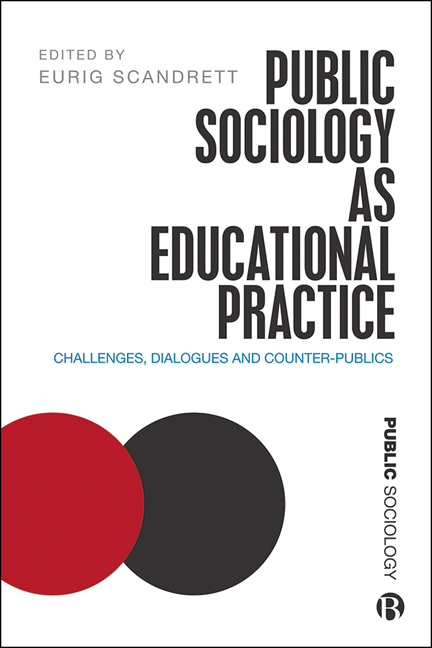Introduction
Published online by Cambridge University Press: 02 March 2021
Summary
Public sociology, the contributors to this volume demonstrate, shares affinities with radical education practice, and this book furthers debates in the dialogue between public sociology and radical education inside, outside, and at the edges of academia. The book as a whole echoes a methodology developed and popularised by public sociologist Michael Burawoy, the extended case methodology (Burawoy, 1998) to facilitate critical dialogue between practitioners of public sociology and education in contested relation to the constitution of ‘publics’, the production of sociological knowledge, and different contexts of pedagogical practice.
Radical education practice includes such forms as popular education (Crowther, Galloway and Martin, 2005); democratic education (hooks, 2003); community education (for example Tett, 2010); critical pedagogy (Giroux, 1988); pedagogy of the oppressed (Freire, 1972). These forms resonate with public sociology in the sense that it is committed to dialogue between ‘public’ knowledges and sociological theory. Public Sociology as Educational Practice therefore starts from Burawoy's (2005: 9) propositions that ‘as teachers we are all potentially public sociologists’, and that ‘between the organic public sociologist and a public is a dialogue, a process of mutual education’ (2005: 8) as a point of departure, to claim that the curriculum of that mutual education requires dual accountability. Public sociology knowledge should not be validated exclusively by the institutions and epistemologies of professional sociology, but rather the validity – and usefulness – of public sociology is established in and through dialogue with publics and, in particular, with subaltern counterpublics. This proposition raises a number of problematics, and critical questions about the relationships between ‘sociologists’ and ‘publics’ in different educational contexts.
Dialogue is central to the practices of public sociology education explored in this book, and the dialogical pedagogy of Paulo Freire, whose influence is fundamental to diverse forms of radical education, is cited repeatedly by the contributors to this book, who are working in public sociology in a range of disciplines and professional contexts. Initially outlined in his Pedagogy of the Oppressed (Freire, 1972; first published in English in 1970 and in Portuguese in 1968), Freire's methodology frames education as a dialogue between the knowledge of the educator and the knowledge of the learner. Drawing on Marxism, phenomenology, Christian humanism and liberation theology, Freire developed these methods whilst working in literacy education with poor workers and peasants in his native Brazil.
- Type
- Chapter
- Information
- Public Sociology as Educational PracticeChallenges, Dialogues and Counter-Publics, pp. 1 - 10Publisher: Bristol University PressPrint publication year: 2020

